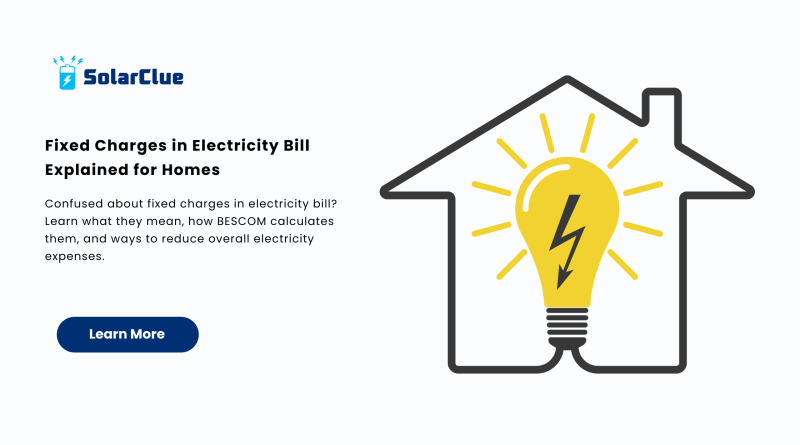Fixed Charges in Electricity Bill Explained for Homes
When you receive your monthly electricity bill, you probably focus on the energy charges—the amount based on the units you consumed. But if you look closely, there’s another important component: fixed charges in electricity bill.
For consumers under BESCOM (Bangalore Electricity Supply Company Limited) and other DISCOMs in India, fixed charges often cause confusion. People ask: Why do I pay fixed charges even if I don’t use electricity? This blog answers that question in detail. We’ll explain what fixed charges are, why they’re necessary, how BESCOM calculates them, and what you can do to manage your bills better.
Table of Contents
- 1 What Are Fixed Charges in Electricity Bill?
- 2 Why Are Fixed Charges Necessary?
- 3 Components of Electricity Bill
- 4 How Are Fixed Charges Calculated?
- 5
- 6 Fixed Charges vs Minimum Charges
- 7 Why Do Bills Seem High Due to Fixed Charges?
- 8 Case Study: Fixed Charges Impact
- 9 Can You Reduce Fixed Charges?
- 10 Fixed Charges for Different Categories in BESCOM
- 11 Importance of Understanding Fixed Charges
- 12 Future of Fixed Charges in India
- 13 FAQs
- 14 Conclusion
What Are Fixed Charges in Electricity Bill?
Fixed charges are a mandatory fee consumers pay to the electricity distribution company regardless of usage. These charges cover the cost of maintaining infrastructure, transformers, power lines, and supply readiness.
Even if your consumption is zero in a given month, you’ll still see fixed charges in electricity bill.
Why Are Fixed Charges Necessary?
-
Infrastructure Costs: DISCOMs maintain substations, meters, and lines.
-
Readiness to Supply: Electricity must be available at any time, whether or not you consume.
-
Grid Stability: Ensures continuous maintenance and capacity availability.
-
Revenue Security: Helps distribution companies recover part of fixed operational expenses.
Components of Electricity Bill
-
Energy Charges (Variable): Based on units consumed (kWh).
-
Fixed Charges: Based on sanctioned load (kW or kVA).
-
ASD (Additional Security Deposit): Refundable deposit for bill security.
-
Other Charges: Taxes, late fees, fuel adjustment charges.
How Are Fixed Charges Calculated?
The fixed charges in electricity bill depend on:
-
Sanctioned Load: The maximum load approved for your connection.
-
Tariff Category: Domestic, commercial, or industrial.
-
State Electricity Regulatory Commission Rules: Each state fixes its own rates.
Example (Domestic Consumer in Bangalore):
-
Sanctioned load: 2 kW
-
Fixed charge per kW: ₹30/month
-
Total fixed charge: ₹30 × 2 = ₹60
Even if your consumption is 0 units, your monthly bill will include ₹60 as fixed charges.
Fixed Charges vs Minimum Charges
-
Fixed Charges: Paid every month based on sanctioned load.
-
Minimum Charges: Paid only if total bill falls below a set minimum value.
Some states have removed minimum charges but retained fixed charges.
Why Do Bills Seem High Due to Fixed Charges?
-
For low-consumption households, fixed charges can make up a significant part of the bill.
-
Businesses with high sanctioned loads may see large fixed charges even if their actual consumption is low.
Case Study: Fixed Charges Impact
Ramesh, a Bangalore resident, had a sanctioned load of 5 kW but used only 1 kW in reality. His fixed charges were ₹150 per month (₹30 × 5 kW). By reducing his sanctioned load to 2 kW, he brought down fixed charges to ₹60, saving ₹1,080 annually.
Can You Reduce Fixed Charges?
Yes, but not eliminate them. Options include:
-
Review Sanctioned Load: Apply to BESCOM to reduce load if actual usage is lower.
-
Energy Efficiency: While fixed charges stay, reducing consumption lowers overall bills.
-
Rooftop Solar: Generate your own electricity to offset energy charges, making fixed charges less significant.
Fixed Charges for Different Categories in BESCOM
-
Domestic Consumers: Lower per kW rate, usually ₹30–₹50/kW.
-
Commercial Consumers: Higher per kW rates due to business demand.
-
Industrial Consumers: Calculated on kVA demand, higher than households.
Importance of Understanding Fixed Charges
-
Helps plan your electricity budget better.
-
Prevents shock when low-consumption months still show higher bills.
-
Encourages right-sizing of sanctioned load.
Future of Fixed Charges in India
Electricity regulators may soon:
-
Revise fixed charges based on smart meter data.
-
Offer slabs for different categories of consumers.
-
Balance between consumer fairness and DISCOM revenue needs.
FAQs
Q1. What are fixed charges in electricity bill?
They are fees for infrastructure and supply readiness, charged regardless of usage.
Q2. Why am I paying fixed charges when I use less electricity?
Because BESCOM maintains infrastructure to supply you anytime.
Q3. Can fixed charges be avoided?
No, but you can reduce them by lowering your sanctioned load.
Q4. Are fixed charges refundable?
No, unlike ASD, they are not refundable.
Q5. How much are fixed charges in Bangalore?
Domestic households usually pay ₹30–₹50 per kW of sanctioned load.
Conclusion
Fixed charges in electricity bill may feel like an extra burden, but they are essential for maintaining the grid and ensuring reliable supply. By understanding how they work and managing your sanctioned load wisely, you can reduce overall costs. For bigger savings, combining efficiency with rooftop solar panels is the best solution.
For detailed solar tips and energy guides, explore solarclue.com and blog.solarclue.com.




